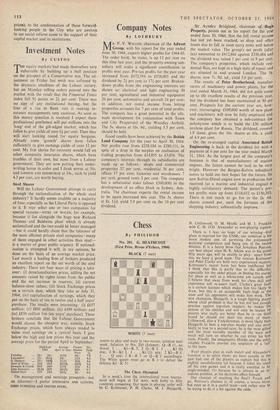Chess
By PHILIDOR
No. 201. G. HEATHCOTE (First Priz.e, Revue d'Echecs, 1904)
BLACK (7 men) WHITE (7 men)
WHITE to play and mate in two moves; solution next week. Solution to No. 200 (Johner): Q-R II, no threat. I . . . Kt-K 5; 2 Q-B 3. 1 . . . Kt (6) else; 2 R-Kt 5. 1 . . . Kt (1) any; 2 Kt-B 6. I . . . Q any; 2 R-R 7 or Q-B 3 accordingly. The White queen must go to R I to defeat the defence Kt-K 51
The Chess Olympiad
In a week's time the international team tourna- ment will begin at Tel Aviv, with forty to fifty countries competing. Our team in playing order will be C. Kottnauer, P. H. Clarke, M. J. Haygarth,
N. Littlewood, 0. M. Hindle and M. J. Franklin with C. H. O'D. Alexander as non-playing captain.
There is, I fear, no hope of our winning-first place is reserved for the USSR; our ambition is the more modest one of surviving the preliminarY sectional competition and being one of the twelve finalists. It is a heavy blow that Jonathan Penrose, our best player since H. E. Atkins was in his prime fifty years ago, will be unable to play: apart from this we have a good team. The veteran Kottnauer and Peter Clarke are both very experienced masters; Kottnauer's recent form has been indifferent but I think that this is partly due to the difficulty, especially for the older player, in finding the energY for chess as well as a whole-time job outside and. I believe that away from work his chess skill and experience will re-assert itself. Clarke's great fault is a certain laziness which makes him too likely to draw, but this is an acceptable fault -high in the team and hit opponents will make him work. The new champion, Haygarth, is a tough fighting player whose chief problem is that he has not had enough practice against top-class masters; he makes the utmost of his abilities and will only be beaten by players who really are better than he is-on third board he should not meet too many of these, Littlewood, also a Yorkshireman, is more likely than Haygarth to beat a top-class master and also more likely to lose to a second-rater; he is the most gifted and the most variable member of the team and much will turn on whether he can strike his best form. Finally, the imaginative Hindle and the soq; reliable Franklin prevent any suspicion of a to the team.
Four players play in each match and Alexander's function is to select them; we have usually in the past had one of the players as captain but this is slightly unsatisfactory (a) because it takes his mind off his own games and it is really essential to he single-minded; (b) because he is always in an in- vidious position, as his decisions affect himself. Our chances of reaching the final? Touch and go; Penrose's absence is, of course, a severe blow. but even so it is a useful team-and rather nice to be trying to do it a bit against the odds.


































 Previous page
Previous page